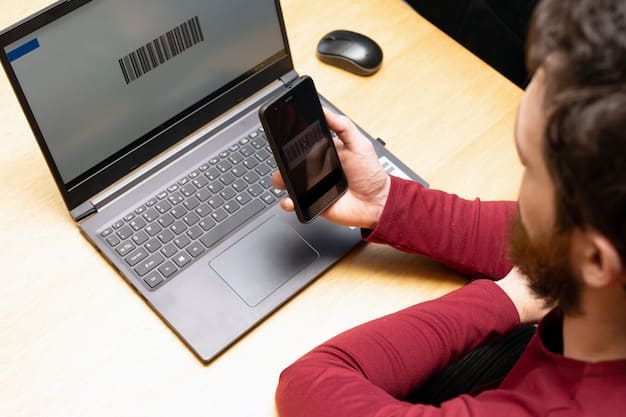Crypto Security for Beginners: Protect Your Digital Assets
Crypto security for beginners involves understanding the risks, implementing strong passwords, enabling two-factor authentication, using secure wallets, and staying informed about the latest threats to safeguard your digital assets.
Navigating the world of cryptocurrencies can feel like exploring a new frontier, full of exciting opportunities and potential pitfalls. One of the most critical aspects to understand from the outset is crypto security for beginners. This guide will walk you through the essential steps to protect your digital assets, ensuring a safer and more rewarding experience in the crypto space.
Understanding the Basics of Crypto Security
Before diving into the specifics, it’s crucial to grasp the fundamental principles of crypto security. Unlike traditional banking systems, cryptocurrencies operate on decentralized networks, which means you are solely responsible for the safety of your funds. Understanding this responsibility is the first step in securing your digital assets.
Why is Crypto Security Important?
Crypto security is paramount because once a transaction is confirmed on the blockchain, it is irreversible. If your private keys are compromised or you fall victim to a scam, recovering your funds can be extremely difficult, if not impossible.
Common Threats to Crypto Security
Several threats can jeopardize your crypto holdings, including:
- Phishing Attacks: Deceptive emails or websites that attempt to steal your login credentials or private keys.
- Malware: Malicious software that can compromise your device and steal your crypto assets.
- Exchange Hacks: Security breaches on cryptocurrency exchanges that can result in the loss of user funds.
- Wallet Vulnerabilities: Weaknesses in wallet software that hackers can exploit to gain access to your crypto.
Being aware of these threats is crucial for taking proactive measures to protect your digital assets. In the following sections, we will explore practical steps you can take to enhance your crypto security.

Therefore, the core of understanding crypto security is about accepting that you have full control and responsibility over securing your assets. Knowing the common threats can also make you more vigilant and prepared to navigate the crypto world safely.
Creating Strong Passwords and Using a Password Manager
One of the most basic yet effective ways to enhance your crypto security is by creating strong, unique passwords for all your accounts. This includes your cryptocurrency exchange accounts, email, and any other services you use to manage your digital assets. Using a password manager can significantly simplify this process.
What Makes a Strong Password?
A strong password should be:
- Long: Aim for at least 12 characters.
- Complex: Include a mix of uppercase and lowercase letters, numbers, and symbols.
- Unique: Avoid using the same password for multiple accounts.
How a Password Manager Can Help
A password manager is a tool that securely stores your passwords and can generate strong, unique passwords for each of your accounts. Some popular password managers include:
- LastPass
- 1Password
- Dashlane
Best Practices for Using a Password Manager
When using a password manager, follow these best practices:
- Choose a Strong Master Password: This is the password you use to access your password manager, so make it very strong and unique.
- Enable Two-Factor Authentication: Add an extra layer of security to your password manager account.
- Keep Your Software Updated: Regularly update your password manager software to patch any security vulnerabilities.
In effect, choosing strong passwords and using a password manager not only protects your cryptocurrency accounts but also enhances your overall online security.
Enabling Two-Factor Authentication (2FA)
Two-Factor Authentication (2FA) is an essential security measure that adds an extra layer of protection to your accounts. It requires you to provide two forms of identification when logging in, making it much harder for hackers to gain access, even if they have your password.
How Does 2FA Work?
With 2FA enabled, you’ll need to provide something you know (your password) and something you have (a code generated by an app or sent to your phone) to log in. This means that even if someone steals your password, they won’t be able to access your account without that second factor.
Types of 2FA
There are several types of 2FA you can use, including:
- Authenticator Apps: Apps like Google Authenticator or Authy generate time-based codes that you enter when logging in.
- SMS Codes: A code is sent to your phone via SMS message.
- Hardware Security Keys: Physical devices like YubiKey that you plug into your computer to verify your identity.
Why is 2FA Important for Crypto Security?
Enabling 2FA on your cryptocurrency exchange accounts and wallets greatly reduces the risk of unauthorized access. It ensures that even if your password is compromised, an attacker would still need access to your second factor to gain entry.
In conclusion, 2FA is of utmost importance for your security, adding a robust layer that makes it exponentially harder for potential attackers to access your accounts.

Choosing Secure Crypto Wallets
A crypto wallet is a software or hardware device that allows you to store, send, and receive cryptocurrencies. Choosing a secure wallet is crucial for protecting your digital assets from theft or loss. There are several types of wallets, each with its own security characteristics.
Types of Crypto Wallets
Here are the main types of crypto wallets:
- Hardware Wallets: Physical devices that store your private keys offline, making them resistant to hacking. Examples include Ledger and Trezor.
- Software Wallets: Apps or programs installed on your computer or smartphone. These can be further divided into:
- Desktop Wallets: Software installed on your computer (e.g., Electrum).
- Mobile Wallets: Apps on your smartphone (e.g., Trust Wallet).
- Web Wallets: Accessed through a web browser (e.g., MetaMask).
- Paper Wallets: Physical printouts of your private and public keys.
Factors to Consider When Choosing a Wallet
When selecting a crypto wallet, consider the following factors:
- Security: Does the wallet support 2FA? Is it open-source and audited by security experts?
- Control: Do you have full control over your private keys?
- Backup and Recovery: Does the wallet provide a way to backup your keys and recover your funds if something goes wrong?
- Ease of Use: Is the wallet easy to use and understand?
Tips for Using Crypto Wallets Securely
Here are some essential security tips:
- Always backup your wallet: Store your backup in a safe place, away from your computer or smartphone.
- Keep your software updated: Regularly update your wallet software to patch any security vulnerabilities.
- Use a strong password: Protect your wallet with a strong, unique password.
- Be wary of phishing: Always double-check the address of the wallet website or app to avoid phishing scams.
Choosing the correct type of crypto wallet significantly contributes to the protection of your digital assets against the cyber world’s hazards.
Staying Informed and Avoiding Scams
The world of cryptocurrencies is constantly evolving, and staying informed about the latest security threats and scams is crucial for protecting your digital assets. Scammers are always developing new and sophisticated ways to trick people out of their crypto, so it’s important to be vigilant and skeptical.
Common Crypto Scams to Watch Out For
Some common crypto scams include:
- Phishing Scams: Fake emails or websites that attempt to steal your login credentials or private keys.
- Pump and Dump Schemes: Groups of people who artificially inflate the price of a cryptocurrency and then sell it for a profit, leaving others with losses.
- Investment Scams: Fake investment opportunities that promise high returns but are actually Ponzi schemes.
Tips for Avoiding Crypto Scams
To avoid falling victim to crypto scams, follow these tips:
- Be skeptical: If something sounds too good to be true, it probably is.
- Do your research: Before investing in any cryptocurrency, research the project and the team behind it.
- Never share your private keys: No legitimate service will ever ask for your private keys.
- Use a secure exchange: Choose a reputable cryptocurrency exchange with strong security measures.
Staying Up-to-Date on Crypto Security
To stay informed about the latest security threats and scams, regularly read:
- Crypto News Websites: Follow reputable news sources that cover cryptocurrency security.
- Security Blogs: Many security experts and companies maintain blogs that discuss the latest threats and vulnerabilities.
- Community Forums: Participate in online forums and communities to learn from other crypto enthusiasts.
Looking at this advice, you can be assured that staying updated with information and avoiding scams can help you a great deal in safeguarding your digital assets and investments.
Securing Your Devices and Network
The security of your crypto assets is not limited to your wallets and accounts; it also depends on the security of the devices and network you use to access them. Securing your devices and network involves several steps, including installing antivirus software, using a VPN, and keeping your software updated.
Installing Antivirus Software
Antivirus software can help protect your devices from malware and other threats that can compromise your crypto assets. Choose a reputable antivirus program and keep it updated.
Using a Virtual Private Network (VPN)
A VPN encrypts your internet traffic and hides your IP address, making it more difficult for hackers to intercept your data or track your online activity. This can be especially useful when using public Wi-Fi networks.
Keeping Your Software Updated
Software updates often include security patches that fix vulnerabilities that hackers can exploit. Make sure to keep your operating system, web browser, and other software updated to the latest versions.
Therefore, these are a few basic steps you can take to ensure the safety and security of your crypto assets against the complex dangers that abound in the digital world.
| Key Point | Brief Description |
|---|---|
| 🔑 Strong Passwords | Use unique, complex passwords and a password manager. |
| 🛡️ Two-Factor Authentication | Enable 2FA on all crypto-related accounts for added security. |
| 🔒 Secure Wallets | Choose hardware or reputable software wallets. |
| 🚨 Stay Informed | Keep up with the latest scams and security practices. |
Frequently Asked Questions
▼
A crypto wallet is a tool used to store, send, and receive cryptocurrencies. It holds your private keys, which are necessary to authorize transactions on the blockchain.
▼
2FA adds an extra layer of security by requiring two forms of identification to log in. This makes it much harder for hackers to access your account, even if they have your password.
▼
A phishing scam is a deceptive attempt to steal your login credentials or private keys. Scammers often use fake emails or websites that look legitimate to trick you into providing sensitive information.
▼
Install reputable antivirus software on your devices and keep it updated. Also, be cautious when downloading files or clicking on links from unknown sources.
▼
Immediately change your passwords, enable 2FA if you haven’t already, and report the incident to the cryptocurrency exchange or wallet provider. Also, consider reporting the theft to law enforcement.
Conclusion
Securing your digital assets is a continuous process that requires vigilance and proactive measures. By understanding the basics of crypto security for beginners, using strong passwords, enabling two-factor authentication, choosing secure wallets, staying informed, and securing your devices and network, you can significantly reduce the risk of theft or loss and enjoy a safer experience in the world of cryptocurrencies.





